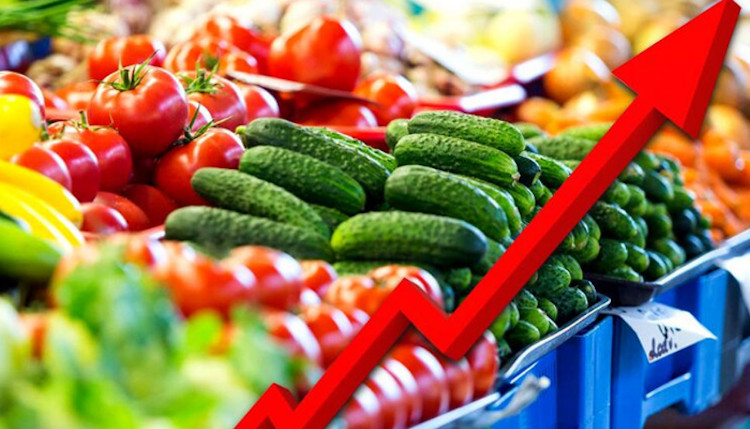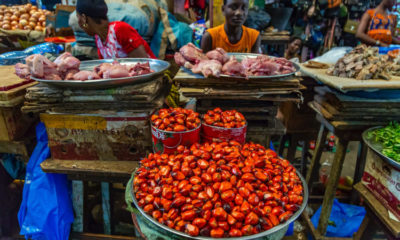Business & Economy
Nigeria’s Inflation Surges 26.72% As Food Prices Rise -NBS Reveals

The National Bureau of Statistics (NBS) has revealed that Nigeria’s annual inflation rate affected food prices, as inflation rose to 26.72 per cent in September from 25.80 per cent in the previous month.
BrandNewsDay reports that NBS made this revelation on Monday, noting that the statistics office said the September 2023 headline inflation rate showed an increase of 0.92 per cent points when compared to the August 2023 headline inflation rate.
The NBS said on a year-on-year basis, the headline inflation rate was 5.94 per cent points higher compared to the rate recorded in September 2022, which was 20.77 per cent.
“This shows that the headline inflation rate (year-on-year basis) increased in September 2023 when compared to the same month in the preceding year (i.e., September 2022),” it said.
According to the report, the food inflation rate in September quickened to 30.64 per cent on a year-on-year basis, which was 7.30 per cent points higher compared to the rate recorded in September 2022 (23.34 per cent).
Food prices have been on the rise across Nigeria in recent years. The situation deteriorated due to the impact of government policies such as the removal of subsidies on petrol, among others.
President Bola Tinubu on 29 May during his inauguration, announced the removal of subsidy on petrol. This development has caused hardship for many Nigerians with its attendant increase in the prices of goods and services.
Over the past four months, the naira has depreciated by over 50 per cent at both the authorised and unauthorised market segments, after the Central Bank of Nigeria (CBN) announced in June that it had collapsed all forex windows into the Investors and exporters (I&E) window.
The move, according to the apex bank, is part of the Nigerian government’s efforts to improve liquidity and stability in the market and attract foreign investors into the Nigerian economy.
Although the policy was widely applauded as well-intentioned and necessary, it has put additional pressure on the local currency and manufacturers, with ripple effects on domestic prices.
Inflation has remained high in Africa’s largest economy, prompting the apex bank to hike interest rates to their highest levels in nearly two decades.
In July, the Central Bank of Nigeria (CBN), raised its benchmark lending rate to 18.75 per cent.
The bank said, “hiking the interest rate has made a lot of difference in moderating the rate of inflation”.
It noted that the option to continue the hike in the policy rate, albeit moderately, also presented a strong alternative premised on the expected liquidity injections into the economy from the recent efforts to unify the nation’s foreign exchange markets.
In July, Mr Tinubu declared an immediate State of Emergency on food insecurity to tackle the increase in food prices.
He also directed that “all matters pertaining to food & water availability and affordability, as essential livelihood items, be included within the purview of the National Security Council.”
In its inflation report Monday, the NBS said the contributions of items on the divisional level to the increase in the headline index year on year are food & non-alcoholic beverages (13.84 per cent), housing water, electricity, gas & other fuel (4.47 per cent), clothing & footwear (2.04 per cent), and transport (1.74 per cent),.
Others are furnishings & household equipment & maintenance (1.34 per cent), education (1.05 per cent), health (0.80 per cent), miscellaneous goods & services (0.44 per cent), restaurant & hotels (0.32 per cent), alcoholic beverage, tobacco & kola (0.29 per cent), recreation & culture (0.18 per cent) and communication (0.18 per cent).
The report said the headline inflation rate in September 2023 was 2.10 per cent, which was 1.08 per cent lower than the rate recorded in August 2023 (3.18 per cent ).
“This means that in September 2023, the rate of increase in the average price level was less than the rate of increase in the average price level in August 2023.
“The percentage change in the average CPI for the twelve months ending September 2023 over the average of the CPI for the previous twelve-month period was 22.90 per cent, showing a 5.47 per cent increase compared to 17.43 per cent recorded in September 2022,” the report said.
The food inflation rate in September 2023 was 30.64 per cent on a year-on-year basis, which was 7.30 per cent points higher compared to the rate recorded in September 2022 (23.34 per cent).
The bureau said the rise in food inflation was caused by increases in prices of oil and fat, bread and cereals, potatoes, yam and other tubers, fish, fruit, meat, vegetables and milk, cheese, and eggs.
“On a month-on-month basis, the Food inflation rate in September 2023 was 2.45 per cent, this was 1.41 per cent lower compared to the rate recorded in August 2023 (3.87 per cent),” it said.
According to the bureau, the decline in food inflation on a Month-on-Month basis was caused by a fall in the rate of increase in the average prices of potatoes, yam and other tubers, bread and cereals, fruits, and fish.
“The average annual rate of Food inflation for the twelve months ending September 2023 over the previous twelve-month average was 25.65 per cent, which was a 6.29 per cent points increase from the average annual rate of change recorded in September 2022 (19.36 per cent),” it said.

















